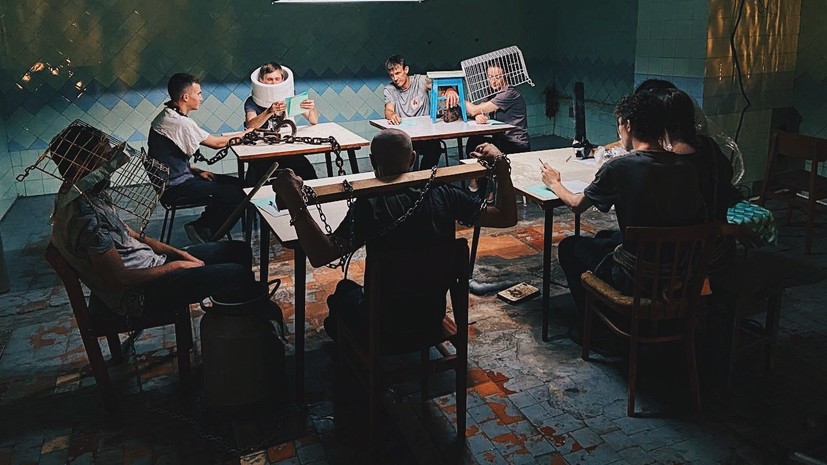The online cinema Wink began showing the action-packed series “The Right to Freedom” with Ilya Malakov and Kirill Kyaro.
The tape tells about the activities of the slave mafia, the victims of which are lonely old people, the disabled and other people who, for one reason or another, find themselves in a difficult situation.
They are ruthlessly exploited in exchange for meager food and a roof over their heads in the basement.
A volunteer organization is trying to fight the mafia, providing all-round support to the disadvantaged.
Touching upon acute social issues, the authors of the tape not only talk about the difficult life of people who find themselves at the mercy of a criminal group, but also give recommendations on how to help them.
The plot is inspired by the stories of real people who find themselves on the sidelines of life.
The author of the idea, Andrei Taratukhin, collected first-hand material.
He met with the prototypes of the heroes at the Square of Three Stations and in other places.
The director and one of the screenwriters of the project was Artyom Dubra, who performs in this role for the first time.
The series also made its debut in this format for cinematographer Lotos Suni Park, who had previously worked only on short films.
The main roles were played by Ilya Malakov (“The Legend of Kolovrat”, “Operation Muhabbat”) and Kirill Kyaro (“Epidemic”, “Ask Martha”, “Treason”).
Also in the tape starred Varvara Feofanova, Valeria Kulikova, Oleg Chugunov and other actors.
In the center of the story is the programmer Anton, who, together with his girlfriend, is going to fly to Cyprus - he was offered a job there in a large IT company.
On the way to the airport, Anton receives a call from a concerned neighbor of his mother who informs him that the woman is missing.
Anton turns the taxi around and goes to his mother.
Not finding her in the apartment, he turns to the police, where he learns that a month ago she left for Krasnodar - Anton himself lives there permanently.
From that moment on, his life turns upside down.
Feeling guilty for rarely calling his mother and even less visiting, the hero does everything possible to find a loved one.
In Krasnodar, Anton encounters a mafia that keeps a hostel for homeless people and forces them to earn their housing, and gets acquainted with the activities of the non-profit organization Libertas, which rescues exploited people from slavery.
The head of the organization is Kirill (Kirill Kyaro), who periodically organizes rescue missions.
© Shot from the TV series “The Right to Freedom”/kinopoisk.ru
From the first two episodes, it becomes clear that Kirill once worked in a private security company, but over time he became imbued with sympathy for the disadvantaged and vulnerable segments of the population and decided to devote his future work to them.
His staff includes Ilya (Oleg Chugunov), an optimistic young man, and Vika (Varvara Feofanova), a hyper-responsible girl on the verge of emotional burnout.
In addition, Kirill's former colleagues from the private security company come to the rescue at the right moments.
The series intrigues with issues that have not previously been in the attention of Russian cinema.
It clearly demonstrates that everyone can fall into labor slavery, but representatives of the older generation who have not managed to adapt to the high-tech world are especially vulnerable.
Left alone, such people often find themselves at the very bottom of the social ladder.
The authors implicitly draw a parallel between young and old people who are separated by a huge wall: if some people can choose their housing in another country with the help of a gadget, then others are unable to even find their way home.
Vulnerability and helplessness are clearly conveyed through the image of a beggar performed by Lyudmila Kovalets.
The woman, outwardly not like a homeless woman, became a victim of circumstances, and a local gang took patronage over her.
A decent appearance is just right for them: you can put pressure on pity so that passers-by give more money.
On the other hand, it sometimes seems as if the beggars themselves are not averse to leading such a life, working in "dust-free work."
However, behind this lies a deeper problem related to distrust of the world and the inability to ask for help.
The authors of the series probably see their goal in narrowing the gap between the younger and older generations.
This idea is prompted by a metaphorical and expressive introductory screensaver - it consists of frames of a computer motherboard on which living organisms sprout in the form of plants.
By the way, the operator did not use visual effects, but filmed the entire clip in macro mode.
Despite beautiful shots, a dynamic narrative and a built-in storyline, as well as a completely unfamiliar world of shadow business, into which the audience is immersed along with the main character, it is felt that some details are not sufficiently developed, and themes are not disclosed.
However, even in this form, the first episodes of the series are captivating.
It is possible that he will continue to be able to keep the interest of the audience, and in the end there will be answers to the questions that arise.

